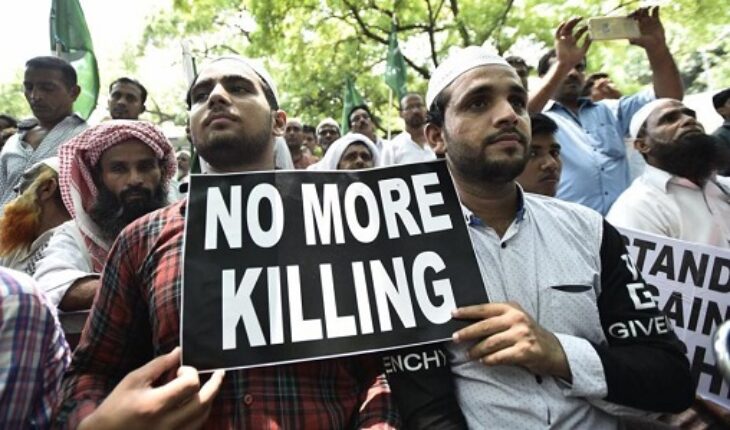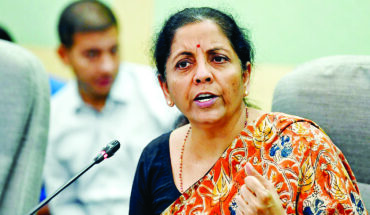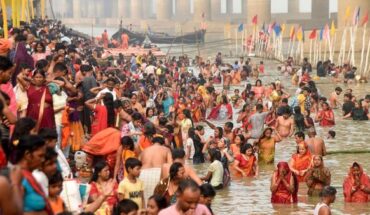On the New Year’s Eve, a group was partying near a Muslim graveyard in Mandar, a town close to Jharkhand’s capital Ranchi. Waseem Ansari and two of his friends approached the group and told them to stop playing loud music near the burial area. This led to an argument.
The group, according to the local police, attacked the 19-year-old daily wage labourer and beat him to death. “His two friends managed to escape. Else, they would have been killed too,” said a resident of the area. Apparently, this was the last reported violent death of the year 2017 of any Muslim in the country, which is increasingly turning Islamophobic since the present government came to power in 2014.
Dozens of incidents were reported last year, in which Muslim men were lynched or killed in public in suspected hate crimes, contributing to a growing sense of insecurity among the community. According to IndiaSpend database, the year recorded the highest death toll (11 deaths) and the most number of incidents of hate violence (37 incidents) related to cows and religion in the country since 2010.
On April 1, Pehlu Khan, a dairy farmer, was going to Haryana with cows and calves. He was beaten to death by 200 cow vigilantes. In May 2017, two youths were publicly lynched in Assam for stealing cows. In June, 16-year-old Junaid Khan was stabbed and killed by a mob while travelling from Delhi to Ballabgarh, Haryana, by train. The protests that resulted coalesced in a movement inspired by a Facebook post by documentary film-maker Saba Dewan, who suggested that “citizens repulsed by the violence” meet at Jantar Mantar in Delhi. #NotInMyName began trending as several cities organized their own marches. Others used it to tweet their alarm over the spate of lynchings of Muslims by vigilante killers since the government’s “beef ban” came into force.
Although Prime Minister Narendra Modi in June broke his silence on incidents of lynchings in the country, the government apparently did not have any particular measure to bring the mob justice under control. “Killing people in the name of Gau Bhakti is not acceptable,” Prime Minister Modi had said on June 29. However, his words seem to have fallen on deaf ears, as a man was beaten to death in Jharkhand on the same day on suspicion that he was carrying beef in his vehicle. In July, a Muslim dairy owner was killed by a mob of over 1,000, after a carcass was found near his home. Cow vigilantes also struck in November, when a man was shot dead in Rajasthan.
According to the latest Human Rights Watch World Report, limitations on free speech and violence against religious minorities, led by vigilante groups which claimed allegiance to the ruling BJP, had been gnawing issues for the country last year. As per an analysis conducted by Pew Research Centre that studied 198 countries, India is fourth worst in the world in terms of religious intolerance. The effects of hate crime are deeper and more wide-ranging than those of other serious crimes such as murders and assault. They impact not only the immediate victim, but also the community with which the victim identifies, affecting social cohesion and stability, the latest IndiaSpend report pointed out.
Muslims remained the target throughout the year for trivial reasons too. Zaffer Hussain, 44, was beaten by civic officials in Pratapgarh, Rajasthan, after he objected to them photographing and taking videos of women defecating in the open, ostensibly for a sanitation campaign. An autopsy report said that Hussain died of a cardiac failure, but his family and eyewitnesses maintain that he had succumbed to injuries. On May 2, 65-year-old Ghulam Mohammed was beaten to death in Bulandshahr, Uttar Pradesh, after a Muslim man and a Hindu woman reportedly eloped from the village. The attackers were allegedly members of the Hindu Yuva Vahini, a Hindu nationalist group which runs a campaign against ‘love jihad’ — an alleged conspiracy by Muslim men to seduce Hindu women and convert them to Islam.
Even judiciary was not completely aloof. On May 24, Kerala High Court ruled the marriage between Akhila Ashokan (alias Hadiya) and Shafeen Jahan ‘null and void’, condemning it as love jihad. Jahan moved the Supreme Court against the ‘arbitrary annulment’ of his marriage to Hadiya and her confinement in her parents’ home. Following this, the Supreme Court ordered a National Investigation Agency (NIA) probe into the matter. The NIA said that it was not an ‘isolated incident’ and that it depicted a pattern gaining currency in Kerala. Hadiya herself had denied the allegations, accusing her parents of wrongful separation from her husband. Hadiya, a homeopathy student, has returned to college and been freed from her parents’ ‘captivity.’ Her college has allowed her to meet Jahan. The questions surrounding the legality and status of their marriage remain shrouded by clouds of confusion.
On December 6, Mohammad Afrazul, a labourer, was mercilessly killed in what can be called one of India’s most gruesome hate crimes in Rajsamand, Rajasthan. After killing him, Afrazul’s assailant Shambhulal Regar circulated on social media a video in which he hacks Afrazul to death with a cleaver, and then sets him on fire. This was followed by Regar’s incendiary speech wherein he justified the act, claiming that he was saving a ‘Hindu sister,’ and warned Muslims saying, “This is what will happen to you if you do ‘love jihad’ in our country.” Reacting to such incidents, activist and former bureaucrat Harsh Mander said, “We have a political leadership now in the country that has created an environment which is permissive of acting out hate speeches and hate actions. Lynching of this kind is a growing phenomenon in many parts of the country.”
Muslims also felt cornered on the political front. Muslims in Gujarat, for example, make up nine percent of the state’s total population. But when the state went to Assembly election in December, the Congress had fielded six Muslims candidates, while the BJP didn’t bother at all.
Interestingly, of 182 Assembly constituencies in Gujarat, 20 have an electorally influencing Muslim population with over 20 per cent voters from the community. But the recent Gujarat election looked different from previous ones as none of the parties had directly talked about Muslims or minorities as a distinct voting unit. Even Rahul Gandhi, who visited over half-a-dozen temples in Gujarat, did not make any direct reference to the community during his election campaign, which was a departure from the past for the Congress party.
Earlier, the saffron party had won the Uttar Pradesh Assembly election with a thumping majority, even in the Muslim-dominated areas. Yogi Adityanath, a hardliner mahant of Gorakhnath Temple, was made chief minister of the state. Since then, he has announced policies and programmes that do not go well with the majority of Muslims. Madarsas, Haj subsidy, removing Taj Mahal from the tourist destination list and strong implementation of beef ban being some of them.
Personal laws of the community, particularly triple talaq, too remained in focus last year. In December, the lower house of the Parliament passed a bill that seeks to criminalise ‘triple talaq’, a style of instant divorce used by some in the Muslim community despite the country’s top court suspending the practice in August. The Muslim Women (Protection of Rights of Marriage) bill 2017, introduced by the Narendra Modi government in the Lok Sabha could see men found guilty of divorcing their wives through triple talaq end up in jail for three years. The bill is, in part, the result of decades of campaigning by Muslim women groups and victims against a practice that allows Muslim men to divorce wives instantaneously by uttering “talaq” three times.
The community leaders are not too happy about several developments that took place in 2017 and wish that 2018 would prove to be better in terms of safety of Muslims. “Though there are a handful of hate-mongers, majority of the people in the country are peace-loving. With their help, this year we will try our best to change things as much as we can,” said Intizar Naeem, Assistant Secretary for Community and National Affairs, Jamaat-e-Islami Hindi. “Jamaat invites and supports everyone who seeks to work for creating peaceful atmosphere in the country.”
Muslims also hope that the community will be given due importance in national policies, programmes and events. Majority of Muslims also oppose any interference in their personal laws. On triple talaq, the All India Muslim Personal Law Board (AIMPLB) has voiced reservations and vowed to take steps through democratic means to “amend, improve or scrap” the proposed Muslim Women’s Marriage Right Protection Bill. “We will take whatever steps required through democratic means to amend, improve or scrap it. There is no move to go to court as of now… The bill was brought in a haste,” said AIMPLB spokesperson Maulana Khalil-ur-Rehman Sajjad Nomani.
The Jamaat-e-Islami Hind also flayed the bill, saying that “it is unnecessary, against justice, against the Shariah and against the Constitution of India.” Separately, Muslim cleric and general secretary of Jamiat Ulama-e-Hind, Maulana Mehmood Madani, accused the Centre of using the triple talaq bill to diverge the attention of the people from the main issues. “This is not even an issue. The cases of instant triple talaq are very less. It seems like the Centre is using the bill for its own benefit. So, I don’t think this effort would benefit the Muslim women. It is not a legal reform but a matter of social reform. It is a calculated step to divert people’s attention from core issues,” he said.
Shia scholar and All India Muslim Personal Law Board vice-president Kalbe Sadiq believes the triple talaq system is unfair to women. “However, it is a personal affair of the community and we will solve it ourselves within one to one-and-a-half years. The government should not interfere in it.”
A lone Muslim minister in Uttar Pradesh, however, recently slammed those supporting triple talaq, arguing if uttering the word ‘nikaah’ thrice does not solemnise a marriage, how can uttering the word ‘talaq’ thrice result in divorce. “My simple question is if saying talaq-talaq-talaq results in divorce, then saying nikaah-nikaah-nikaah should mean that wedding has been solemnised,” the state’s Waqf and Haj Minister Mohsin Raza said.
A fresh year has begun. It’s time for the community and the country to start anew. As former union minister Salman Khurshid puts it, “For Indian Muslims, co-existence, not confrontation, is the answer for survival and prosperity. People who demonise Islam to serve their personal agenda are no better than those who use it to perpetuate everything that it opposes in its true, sublime form.”
Let it be clear, Muslims will lynch fear this year
Published Date: 19-01-2018 | 11:15 am





